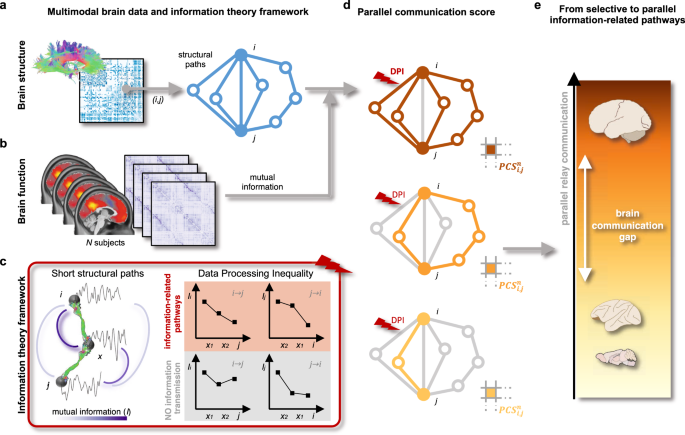2023-12-19 スイス連邦工科大学ローザンヌ校(EPFL)
◆この研究では、ヒトと他の哺乳動物との比較が行われ、ヒトの脳では同じソースとターゲット間で複数の平行な経路が存在し、これらの平行経路が個々の指紋のように一意であることが特定されました。このモデルは、進化や計算神経科学における新しい視点や研究方針を提供し、将来的には神経リハビリテーションや高齢期の認知機能の低下予防に対する洞察をもたらす可能性があります。
<関連情報>
- https://actu.epfl.ch/news/more-parallel-traffic-observed-in-human-brains-t-2/
- https://www.nature.com/articles/s41467-023-43971-z
ヒトの脳内ネットワークでは、マカクや雄マウスと比較して、並列的な情報伝達が増加している証拠 Evidence for increased parallel information transmission in human brain networks compared to macaques and male mice
Alessandra Griffa,Mathieu Mach,Julien Dedelley,Daniel Gutierrez-Barragan,Alessandro Gozzi,Gilles Allali,Joanes Grandjean,Dimitri Van De Ville & Enrico Amico
Nature Communications Published:11 December 2023
DOI:https://doi.org/10.1038/s41467-023-43971-z

Abstract
Brain communication, defined as information transmission through white-matter connections, is at the foundation of the brain’s computational capacities that subtend almost all aspects of behavior: from sensory perception shared across mammalian species, to complex cognitive functions in humans. How did communication strategies in macroscale brain networks adapt across evolution to accomplish increasingly complex functions? By applying a graph- and information-theory approach to assess information-related pathways in male mouse, macaque and human brains, we show a brain communication gap between selective information transmission in non-human mammals, where brain regions share information through single polysynaptic pathways, and parallel information transmission in humans, where regions share information through multiple parallel pathways. In humans, parallel transmission acts as a major connector between unimodal and transmodal systems. The layout of information-related pathways is unique to individuals across different mammalian species, pointing at the individual-level specificity of information routing architecture. Our work provides evidence that different communication patterns are tied to the evolution of mammalian brain networks.


